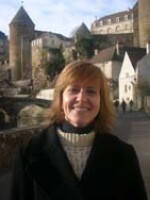MICHEL MARTIN, HOST:
Now to Paris, where President Trump joined other leaders from around the world today to commemorate the 100th anniversary of the end of World War I. The ceremony was rich with symbolism and paid tribute to those who suffered and sacrificed a century ago. NPR's Eleanor Beardsley was there, and she's with us now from Paris. Eleanor, thanks so much for joining us.
ELEANOR BEARDSLEY, BYLINE: It's good to be with you, Michel.
MARTIN: So you were at the ceremony today. What was it like?
BEARDSLEY: Well, you know, all the leaders, except for Trump and Putin, president - Russian President Vladimir Putin arrived together. They walked to the site under black umbrellas. Trump came in his motorcade that was actually briefly held up by a couple of topless feminist protesters, the group Femen. They got through the barriers. And, you know, Michel, at the ceremony, he didn't seem happy. He had a scowl on his face during the whole time. But it was a beautiful ceremony, very solemn at the Tomb of the Unknown Soldier under the Arc de Triomphe. American cellist Yo-Yo Ma played Bach, and you could just look down the empty rainy Champs-Elysees. A lot of young people were involved. High school students read letters from World War I soldiers. And here's a student reading a letter from American Captain Charles Normington written a century ago in Paris on the day of the armistice.
(SOUNDBITE OF ARCHIVED RECORDING)
UNIDENTIFIED STUDENT: (Reading) Each soldier had his arms full of French girls, some crying, others laughing. Each girl had to kiss every soldier before she would let him pass.
BEARDSLEY: But, Michel, the joy of the war ending was also mixed with the memories of horrific suffering and death on a massive scale. World War I was the first modern war.
MARTIN: I understand that the French President Emmanuel Macron had some pointed remarks. Tell us about that.
BEARDSLEY: He did. He said World War I was not that far away, and the kind of nationalism that led to the two World Wars in Europe is on the rise again and that history could repeat itself. Here he is.
(SOUNDBITE OF ARCHIVED RECORDING)
PRESIDENT EMMANUEL MACRON: (Speaking French).
BEARDSLEY: He says, "patriotism is the exact opposite of nationalism. Nationalism is a betrayal of patriotism because it says our interests are first. Who cares about the others?" Now, many of the commentators saw these remarks partly aimed at President Trump, who has lately said he considers himself a proud nationalist, but also at other illiberal leaders in the crowd, Russian President Vladimir Putin, for example. Macron said, "what makes a great nation is moral values."
Michel, I can't emphasize how big this whole event was in France, where the first world war was mostly fought. For the last week, President Macron has been going around to all the major battle sites. And I caught up with him in Verdun. That's where German and French troops slaughtered each other in muddy trenches for nearly a year in 1916. And here's what it was like on Tuesday.
(SOUNDBITE OF BELLS RINGING)
BEARDSLEY: I'm standing here near the battlefields of Verdun in what used to be the village of Vaux-devant-Damloup. The village was completely wiped from the map in 1916 during the battle of Verdun. In its place is a memorial to the dead and just a reconstructed bell tower that rings out the hour.
(SOUNDBITE OF SONG, "LA MARSEILLAISE")
FRENCH ARMY CHOIR: (Singing in French).
BEARDSLEY: An army choir singing "La Marseillaise," the French national anthem, greets Macron at the famous Verdun ossuary at Douaumont. The ossuary contains the bones of 130,000 French and German unidentified soldiers. They're broken up and mixed together, and you can peer through little viewing windows to see piles of bones and skulls. Verdun resident Alain Louppe has come out to meet the president. He says, "Verdun was a symbol of hatred. But now it's a symbol of Franco-German reconciliation."
ALAIN LOUPPE: (Through interpreter) We have built Europe now to unite because World War I was a real fratricide. But, now, there are tensions rising again. Those of us who live here don't understand that. We have inherited this history, and it's very heavy to bear. Everyone should come to Verdun to see what happened. It was a total catastrophe.
BEARDSLEY: So, Michel, that's what I heard this week from an ordinary Frenchmen, you know? People are worried about the rise of populism and nationalism here.
MARTIN: So, given that, I was curious about what kind of coverage President Trump is getting there.
BEARDSLEY: Well, I would say he just never quite hit his stride when he came. As soon as he stepped off the plane Friday night, he tweeted that he was insulted by something that President Macron had said. So he was obviously briefed on the plane about that. But then, Macron's office issued a statement, saying Trump had misunderstood his comments. The two leaders patched it up. They did that on Saturday morning. But then, he canceled his trip to the battlefield and cemetery at Belleau Wood because of bad weather. And that was - he was heavily criticized for that.
MARTIN: And - but he did speak at another American cemetery today, didn't he, as briefly as you can, Eleanor?
BEARDSLEY: He did, and he paid tribute to those Marines. But right as he began to talk, Macron was opening a peace summit, so the TV screen was split. And they were saying what - symbolism. You have the America First president and then the multilateral leaders of Macron and German Chancellor Merkel. And, by the way, Trump is not attending the peace forum. He has already left France.
MARTIN: That is NPR's Eleanor Beardsley, joining us from Paris. Eleanor, thank you.
BEARDSLEY: Thank you, Michel. Transcript provided by NPR, Copyright NPR.




